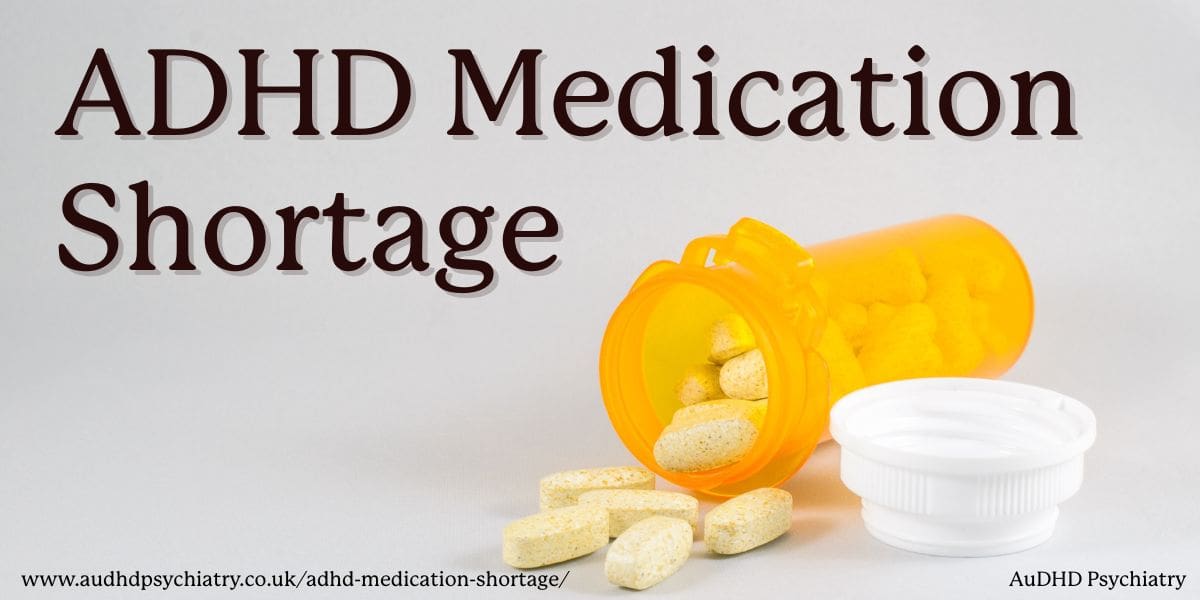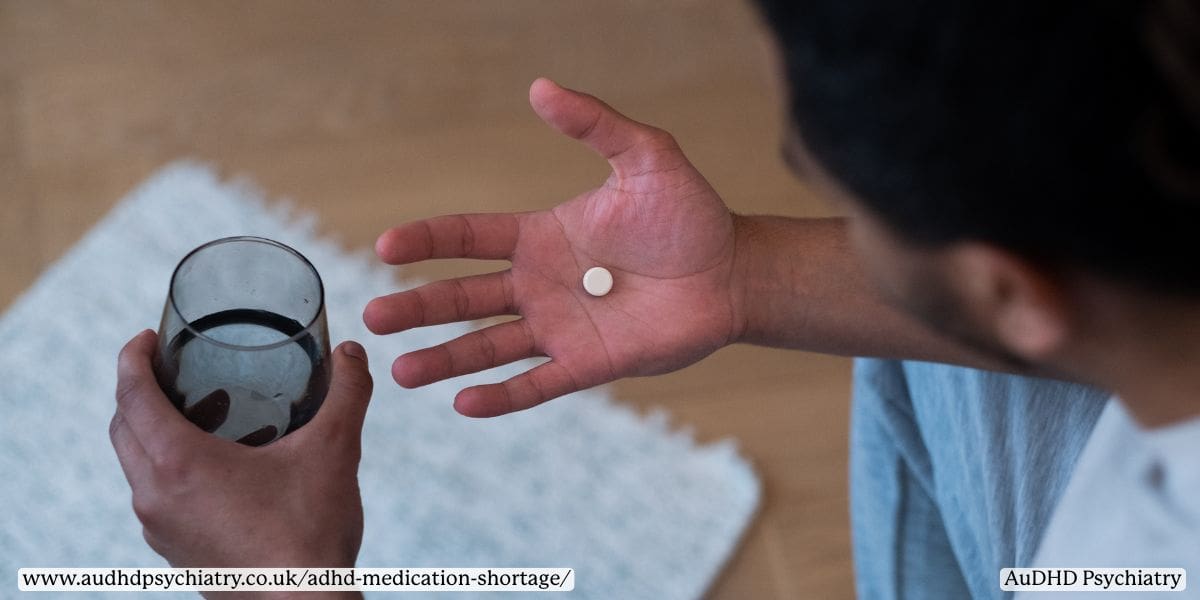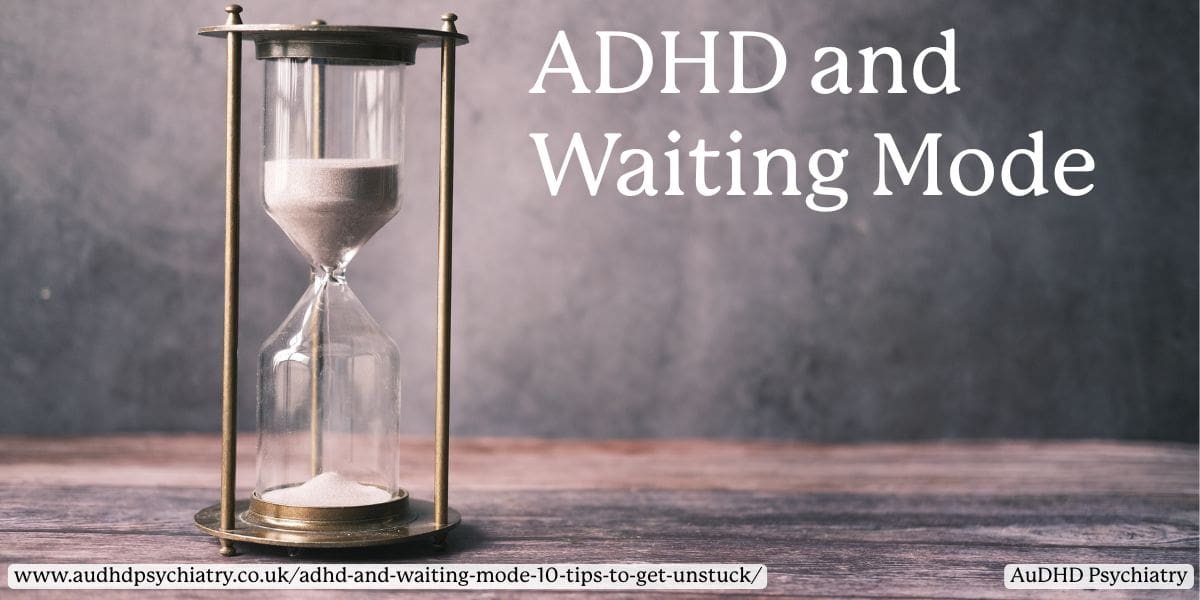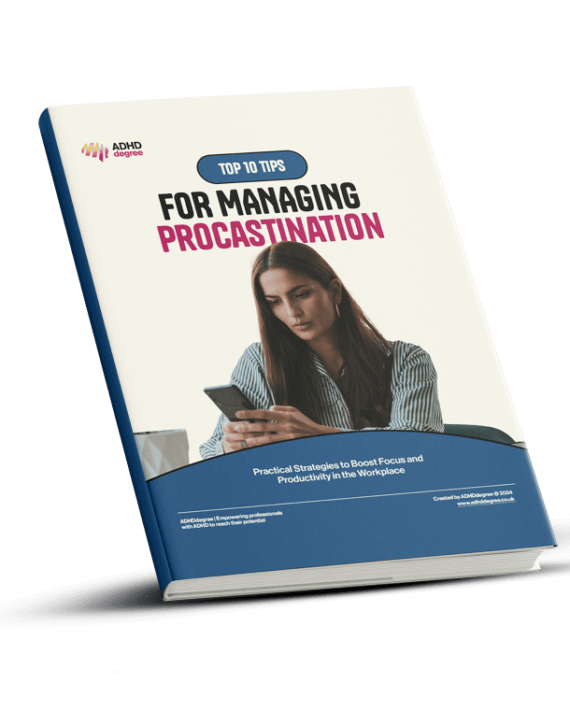If you’re struggling to fill your prescription or wondering when supplies will return to normal, you’re not alone. A shortage of ADHD medications is currently affecting the UK, including methylphenidate prolonged-release capsules and tablets, lisdexamfetamine capsules, guanfacine prolonged-release tablets, and atomoxetine capsules and liquid.
This shortage stems from a surge in demand for medications to treat ADHD and shifts within the companies that manufacture and distribute these medications. The supply chains remain delicate, with products potentially available only on a temporary basis.
This article will cover strategies for managing symptoms, navigating pharmacy stock issues, and finding safe, GP-approved alternatives. If you need immediate updates or guidance, you’ll find helpful links, support tools, and expert-backed insights throughout this guide.
Let’s move on to discuss what’s driving the ongoing disruption and what you can do about it.
Understanding the ADHD Medication Shortage
“The American Society of Health-System Pharmacists reports shortages of many forms of Methylphenidate, Dexmethylphenidate, and Lisdexamfetamine Dimesylate medications across the USA – all of which are used as ADHD treatments.” — Dr. Samantha Brooks, Medical Writer and Researcher at News Medical Life Sciences
The Department of Health and Social Care raised an alarm about ADHD medications running short in September 2023. The disruption has affected multiple medications, including Methylphenidate, Lisdexamfetamine, Guanfacine, and Atomoxetine, with stock availability fluctuating depending on strength, dosage, and brand.
For many, the Elvanse shortage reflects just how widespread and persistent these challenges have become. The shortage began in September 2023, marking a critical point for attention deficit hyperactivity disorder ADHD medication supplies.
What is the current state of the ADHD medication supply?
The medication supply chain remains unstable across the UK. Stocks vary weekly, and pharmacies often can’t guarantee which ADHD medications will be available. A recent survey paints a grim picture – only 8% of UK patients got their medications without interruption. The situation looks worse with 27% of patients completely cut off from supplies and 33% dealing with extended gaps in their treatment.
These figures confirm an ongoing UK ADHD medication shortage with widespread consequences. Two key factors drive this shortage:
- Production capacity hits manufacturing roadblocks
- ADHD medication demand has shot up globally
Currently, Methylphenidate availability varies by brand and strength. Some brands like Concerta XL and Xaggitin XL are especially difficult to find.
Lisdexamfetamine (Elvanse®) stocks will likely stay limited for months. All the same, you can find Guanfacine (Intuniv®) and Atomoxetine, but their pharmacy stock remains uncertain.
Healthcare providers also face challenges with prescription requests, especially when trying to secure prolonged-release tablets or source alternative medications quickly. Stock shortages make it hard to maintain shared care agreements, especially when patients rely on consistent dosing for symptom control.
How does the shortage affect Attention Deficit Hyperactivity Disorder (ADHD) symptoms and management?
Medication shortages have hit ADHD patients hard. Research shows 70% of patients now ration their medicine. The Royal College of Psychiatrists confirms these medications play an important role in treatment, especially for young people.
This shortage disrupts daily life in several ways:
- People struggle more to stay focused
- Impulsive behaviour becomes harder to control
- Tasks and organisation become major challenges
- Academic and work performance might suffer
Children’s education has become a major concern during this shortage. Dr Elaine Lockhart, who chairs the Royal College of Psychiatrists’ Child and Adolescent Faculty, points out that some children simply cannot switch to alternative medications. This leaves families with few options during a time when structure and consistency are most needed.
Newly diagnosed patients face additional challenges. Many ADHD services now hold off on writing new prescriptions until they’re sure about steady medication supplies.
Managing the Shortage
The ongoing ADHD medication shortage has patients, families, and healthcare providers urgently seeking coping strategies to help regulate symptoms and support day-to-day functioning. With medications in short supply, practical adjustments in lifestyle, routine, and school coordination have become essential for many households.
Strategies for managing ADHD symptoms during the shortage
Sleep hygiene is a vital part of controlling ADHD symptoms. ADHD brains work intensely all day to process and filter stimulation, which makes good rest essential. Establishing consistent sleep routines, limiting screen time before bed, and using calming activities like reading or meditation can improve overall focus and reduce emotional overwhelm.
These practical approaches have shown good results:
- Body Doubling: Someone works next to you during tasks. This simple technique helps improve focus and motivation despite its simplicity.
- Sound Therapy: Studies show that brown noise reduces distractibility and helps attention regulation by blocking disruptive sounds and possibly triggering brain chemicals that aid focus.
- Movement Integration: Incorporating physical activity throughout the day, such as alternating between sitting and standin,g can help with impulse control, reduce restlessness, and act as a natural reset for focus.
Healthcare providers suggest these coping mechanisms to manage symptoms right now:
- Timer apps help track how long tasks take and manage time well
- Well-laid-out daily routines work best
- Regular exercise should be part of your daily schedule
- Mindfulness and meditation techniques can help
Parents need to work closely with school Special Educational Needs (SEN) teams about giving medication. Schools usually need an original medication pack with labels for each child. Due to ongoing supply chain issues, some families must now transfer limited medication supplies between home and school, making detailed communication with the school support team more important than ever.
Support organisations are a great way to get resources. The ADHD Foundation offers lots of materials, including videos, podcasts, and guides you can download about sleep support, exam preparation, impulse control, and social skills development.
Medical guidance matters most when you need to adjust medication. Some patients do well with planned medication breaks on weekends or holidays, but this needs medical supervision.
On top of that, some medications, especially Guanfacin (Intuniv), need careful management and should never be stopped suddenly without professional advice. This can lead to withdrawal symptoms or serious side effects.
How does the ADHD medication shortage affect symptoms and management?
ADHD medication supply disruptions have created major challenges for patients trying to manage their symptoms. Studies show that only 8% of people managed to keep steady access to their medication. This shortage severely affects their daily life and well-being.
The shortage affects widely prescribed ADHD medicines like Methylphenidate, Elvanse (Lisdexamfetamine), Guanfacine (Intuniv), and Atomoxetine. Patients often experience delays in receiving their prescriptions or may be forced to switch between brands, change dosages, or ration their medication. It’s critical to seek health advice before stopping or adjusting medication, especially with prolonged-release tablets or medications that impact blood pressure and mood.
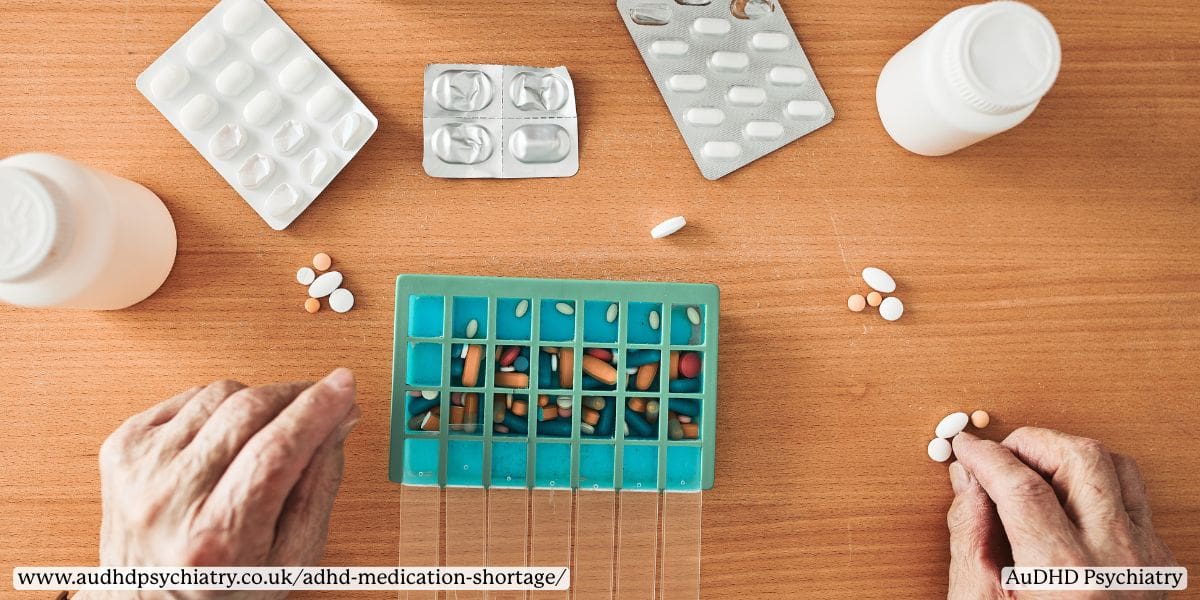
Changes in medication schedules
Many patients now must alter their treatment routines because of the shortage. About 70% of people now ration their medication by either reducing their dosage or skipping days entirely. People who need long-term treatment face several issues when their medication schedules change can experience:
- Mental fatigue and migraines
- Increased agitation and anxiety
- Short-term memory difficulties
Doctors stress that some medications, especially Guanfacine, need careful handling. Blood pressure can fluctuate dangerously if patients stop taking it abruptly. Any adjustment to your treatment plan should be made with the guidance of your GP or ADHD service provider.
Effects on school performance
Academic achievement suffers greatly during the UK ADHD medication shortage. Students who can’t get their medication face multiple challenges.
Research shows that consistent ADHD treatment links directly to better academic results. The largest longitudinal study found that three months of treatment raised grade-point averages by 0.49 points. Three years of steady treatment showed an even more dramatic improvement of 2.38 points.
Currently, 92% of students taking ADHD medication report concerns about their academic progress. Teachers and parents are noticing:
- More unfinished assignments
- Students arriving late or missing school more often
- Students struggling to focus during lessons
The Royal College of Psychiatrists recognises that many young people need these medications among other forms of care to reach their full potential. Without access to their usual medication, many students struggle with impulsivity, forgetfulness, and emotional regulation.
Some parents are choosing to keep their children home rather than sending them to school without proper support. But this issue doesn’t stop with school. A staggering 91% of adults on ADHD medication also worry about their work performance. From missed deadlines to workplace tension, the ripple effects of this nationwide ADHD medication shortage are far-reaching.
Other suggestions for Managing the Shortage
UK parents and caregivers are under growing pressure due to the ongoing ADHD medication shortage. The good news is you can try several coping strategies to handle symptoms and keep daily routines on track.
Strategies for managing ADHD symptoms during the shortage
A well-structured environment makes a huge difference in managing symptoms. You need a dedicated workspace with few distractions to stay focused and productive. Regular daily schedules give ADHD brains the predictable patterns they need.
Physical activity helps control symptoms naturally. Around 20-30 minutes of exercise before tough tasks boosts dopamine levels – the same brain chemical that ADHD medications target. Quick movement breaks between activities can help you focus better and feel less restless.
Sound therapy works well, too. White or brown noise blocks out distracting sounds and helps with concentration. Many people find that ambient sounds like rainfall or soft music in the background let them focus better while working or studying.
Time management becomes extra important without medication. Big tasks feel less daunting when you break them into smaller chunks. Visual timers help you track time better and are especially helpful with task-switching difficulties.
Your diet plays a significant role in helping manage ADHD symptoms. Your brain works better with balanced meals rich in complex carbs, protein, and omega-3 fatty acids. Regular meals help keep your energy steady all day by avoiding sugar crashes.
Sleep matters even more during medication shortages. A steady bedtime routine, less screen time before bed, and enough rest can make symptoms easier to handle the next day.
Students should work closely with their teachers. Class accommodations like movement breaks, quiet spaces, or extra time for assignments help maintain good grades. Visual schedules and checklists make it easier to stay organised and finish tasks.
Support groups are a great way to get help during these tough times. You can learn practical tips and feel less alone by sharing experiences with others in the same situation.
Note that these strategies work differently for everyone. Something that helps one person might need tweaking for another. Try combining strategies until you find what best suits your lifestyle and symptoms.
Working with Your Healthcare Team

“We urge patients who will be affected by these shortages to speak with their pharmacist about supply. They should also consult with their prescribers early about their treatment plan, as new prescriptions may be needed to access alternate treatments.” — Therapeutic Goods Administration, Australian Government Department of Health and Aged Care
Healthcare professionals across the UK continue to monitor the nationwide shortage of stimulant medications, which remains a growing concern across both primary care and social care systems.
Why the shortage happened
Two main factors drive the current crisis. Several pharmaceutical companies have reported manufacturing issues and delays in sourcing active ingredients. The rising global demand for ADHD medication has further strained supply chains, leading to reduced stock availability at both NHS and independent pharmacies.
Current status of ADHD Medication Supply in the UK
As of May 2025, the UK continues to experience intermittent shortages of several ADHD medications. While some improvements have been noted, particularly in the availability of certain medications, a definitive timeline for the complete resolution of these supply disruptions remains uncertain.
- Lisdexamfetamine (Elvanse®): Most strengths are available; however, intermittent supply issues persist for certain dosages. Healthcare providers are advised to prescribe Elvanse capsules generically until normal supply resumes.
- Methylphenidate Prolonged-Release Tablets: Brands such as Concerta XL, Xaggitin XL, and Equasym XL continue to face supply challenges. Availability varies by region and specific dosage.
- Atomoxetine and Guanfacine (Intuniv®): Supply issues have been resolved, and prescribing restrictions have been lifted.
Communication with GPs
Recent findings paint a troubling picture of healthcare communication. Only 15% of patients with ADHD prescriptions heard from their GPs about the situation. The picture gets worse – 25% of patients haven’t received any updates about their medication management.
Frequent communication with your healthcare team can improve access to drug shortage information and help plan your treatment.
Pharmacy coordination tips
You can improve your chances to get medication by:
- Asking for prescriptions 14-21 days before you run out
- Checking with different pharmacies since stock levels vary
- Looking into independent pharmacies that might use different suppliers
It is recommended to order repeat medication from your GP with at least 7-14 days of supply left to ensure continuity. You can also search online by using phrases like “buy methylphenidate” or “elvanse online pharmacy” to locate available stock. However, be sure to purchase only from registered pharmacies approved by the NHS or UK government.
Managing medication at school
Students who take medication during school hours need their parents and school staff to work together. The current shortages make it hard to keep separate supplies at home and school. A clear handover system works better:
- Move medications between home and school daily
- Keep the Special Educational Needs (SEN) team updated about possible disruptions
- Have backup plans ready for days without medication
Medical teams stress the need for specialists, GPs, and pharmacists to stay connected. Emergency systems help primary care teams get specialist advice quickly when needed. Doctors can now switch between certain methylphenidate brands without asking specialists first.
Safe Medicine Management During the ADHD Medication Shortage
ADHD medication shortages across the UK make proper medication management vital. Medical professionals stress the need for heightened alertness while handling available supplies and adapting to temporary changes in treatment routines.
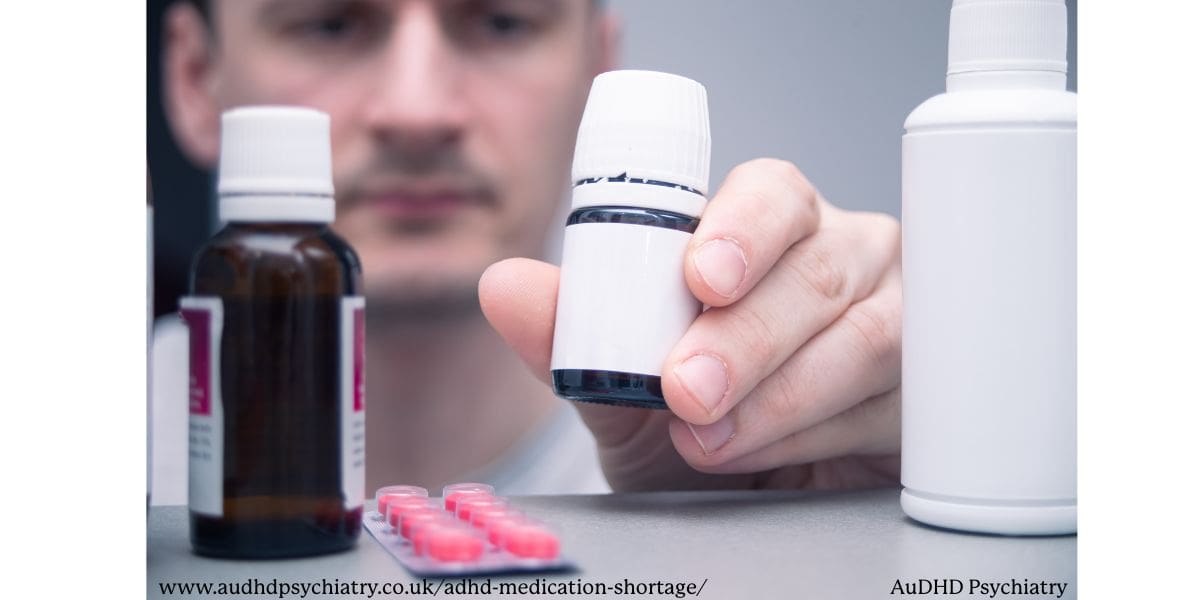
Proper storage of available medication
These safe storage practises help keep medications effective:
- Keep medicines in their original packaging at room temperature
- Store away from direct sunlight and moisture
- Ensure medications remain out of children’s reach
- Share medication between households only when children split time between homes
The NHS advises against requesting separate prescriptions for different locations when managing multiple households. Parents must coordinate medication transfers between homes and ensure proper storage conditions at each location.
When to take medication breaks
National Institute for Health and Care Excellence (NICE) guidelines support planned medication breaks under specific circumstances. These breaks help extend current supplies and reduce long-term medication tolerance.
Medication breaks work well:
- During weekends
- On non-school days
- Throughout holiday periods
- When daily activities are lighter
However, some medications need special attention. Guanfacine (Intuniv), unlike other ADHD medications, needs gradual dose reduction before stopping. Patients who take Guanfacine should contact their specialist team before supplies run low.
Methylphenidate and lisdexamfetamine users can safely take short breaks. These medications can stop briefly without needing dose adjustments when resumed. Performance might drop during these periods, so breaks may not suit everyone.
Healthcare providers suggest:
- Ordering prescriptions 14-21 days before supplies run out
- Maintaining consistent communication with prescribers
- Following professional guidance for any medication adjustments
- Documenting medication break patterns
Pharmacists recommend checking multiple locations for available supplies since stock levels vary between outlets. Independent pharmacies often use different suppliers than larger chains, which might offer alternative sources for prescribed medications.
Remember, medication management strategies should align with individual needs and circumstances. Healthcare providers must approve any significant changes to treatment routines.
Medication Administration and Treatment Plans
Medical professionals are adapting their treatment plans to manage ADHD effectively during ongoing supply challenges. The National Health Service promotes personalised approaches that match each patient’s specific needs with available medications.
Adjusting medication administered and treatment plans during the shortage
Healthcare providers now recommend several proven approaches for patients who face insufficient supplies:
- Temporary Brand Switches: Doctors can switch between generic ADHD medications without requiring additional specialist services. This flexibility helps prescribers maintain treatment continuity while managing supply constraints.
- Modified Release Options: Doctors might prescribe alternative release versions when standard formulations aren’t available. Switching to Medikinet XL® (50:50 8-hour duration) provides similar benefits like other extended-release medications.
- Gradual dose adjustments: Patients on higher doses of methylphenidate (over 36mg daily) may need to taper slowly, as advised by your healthcare provided. Meanwhile, atomoxetine users may pause treatment briefly without tapering, although gradual reduction is preferred to minimise side effects and withdrawal symptoms.
Healthcare providers consider several factors when modifying dosages:
- Low-dose methylphenidate users (up to 36mg daily) can safely pause treatment with minimal withdrawal risks
- Higher-dose patients need gradual reduction, typically dropping by 10mg weekly
- Atomoxetine users can stop temporarily without tapering, though gradual reduction remains the preferred choice

The NHS recommends delaying stimulant prescriptions for newly diagnosed ADHD patients until the UK-wide shortage stabilises. This prevents mid-treatment interruptions and helps maintain patient safety across the healthcare system.
Clinicians also rely on rapid response systems to coordinate with specialist teams. These systems allow primary care doctors to adjust treatment quickly in response to real-time stock updates and avoid disruptions in prescription medication.
Healthcare services temporarily hold off on starting medication for newly diagnosed patients until supplies become more accessible. This careful approach maintains consistent treatment protocols while preventing disruptions mid-therapy.
Medical professionals strongly warn against self-adjusting medication routines. Professional supervision must guide every modification, especially with medications like Guanfacine that need careful dose reduction.
The Department of Health and Social Care suggests issuing generic prescriptions whenever possible. This gives pharmacists more flexibility to source available stock and helps maintain treatment continuity during supply constraints.
Alternative sources for ADHD medication
If your usual pharmacy doesn’t have your ADHD prescription, consider:
- Trying a few different pharmacies that might have it in stock
- Using the NHS website to locate pharmacies in your area: https://www.nhs.uk/service-search/pharmacy/find-a-pharmacy
- Visiting independent pharmacies that may have access to different suppliers or wholesalers
Schools and Educational Settings
British educational institutions face unprecedented challenges as they support students with ADHD during ongoing medication shortages. The Royal College of Psychiatrists highlights that many young learners rely on these medications as a basic part of their educational support system.
Supporting students with ADHD during the shortage
Schools throughout Britain have adapted their strategies to help affected students. The National Education Union suggests several classroom changes:
- Structured Learning Environments: Quiet zones within classrooms help students focus and minimise distractions
- Visual Learning Tools: Mind maps and colour-coded schedules help students process information better
- Movement-Based Learning: Physical activities between lessons naturally boost student concentration
Special Educational Needs Coordinators (SENCOs) work together with teachers to create personalised support plans. These plans include academic and behavioural aspects, which give students complete support during medication disruptions.
Teachers get guidance to spot early signs of concentration issues. This helps them step in quickly with solutions like short breaks or hands-on activities. Schools also stay in touch with parents about any changes in behaviour or academic challenges.
The Department for Education stresses the need for flexible assessment methods. Schools give extra time for assignments and adjust exam conditions as needed. This helps evaluate students fairly while recognising how medication shortages affect their academic performance.

Technology is crucial in helping each affected child’s well-being. Educational apps and digital tools boost focus and organisation. Many schools now use assistive technology, such as text-to-speech software and digital planners, to help students manage their daily tasks better.
Peer support systems are really helpful right now. Study buddies and small group work create supportive environments where students stay involved even with medication-related challenges.
An increase in students seeking support from school counselors indicates the emotional toll of medication shortages. In response, many schools have expanded mental health services, offering additional counseling sessions and stress management workshops.
Staying Informed
British families need to stay updated about the limited supply of ADHD medication. The British Generics Manufacturers Association expects supplies to improve gradually until early 2025, bringing some relief to those affected by the current situation.
Where to find updates about ADHD medication shortages
The Department of Health and Social Care keeps an updated list showing which ADHD medications are available. This complete resource helps families track supply issues with methylphenidate, lisdexamfetamine, and other key medications of different brands and strengths.
Several trusted organisations are ready to help:
- NHS 111 Wales: Lets you search local pharmacies that might have stock
- ADHD Foundation: Gives educational materials and support resources
- NICE Guidelines: Keeps clinical advice and patient information current
Major pharmacy chains now have online tools to check medicine availability nearby. Healthcare providers suggest calling pharmacies directly to check stock before making the trip.
The UK Government works together with key partners to solve supply issues:
- Medicines and Healthcare products Regulatory Agency
- Health boards
- Community pharmacies
- General practitioners
These mutually beneficial alliances help provide clinical advice about different treatment options. They explain the differences between ADHD medicines and brands that contain similar active ingredients.
The UK Government has set up strict measures to ensure fair distribution:
- Export bans on ADHD medications
- Rules against wholesale hoarding
- Supply chain monitoring
The Department of Health and Social Care notes that most supply problems have been fixed, but some issues remain. Local supplies might take time to return to normal as wholesalers and community pharmacies get new stock and handle delayed prescriptions.
Parents can get school-related help at neurodiversity drop-in hubs that have opened in many regions. These hubs give practical advice and help families connect with local support networks.
Additional information and resources on the ongoing shortages in ADHD medication
- Both national and local resources are available to offer information and support during the ongoing shortage.
- Visit the NHS website for the latest updates on the shortage and advice on managing ADHD symptoms.
- Reach out to your healthcare provider or ADHD team for personalized advice and guidance on navigating the supply challenges.
For more info on ADHD and medication, check out: UK ADHD Meds: How to Get ADHD Medication Revealed.
ADHD Medication Shortage: Conclusion
The ongoing shortage of stimulant medications has left many UK families, students, and adults with ADHD navigating unprecedented disruptions to their care. From missed school days to job-related challenges, daily lives are genuinely affected. While manufacturers of amphetamine and other name brands work to address supply chain issues, the timeline for a full recovery remains unclear.
Parents, teachers, and the wider healthcare community have shown incredible resilience, applying best practices like behavior therapy, structured routines, and school accommodations to support each ADHD child. However, there’s still an urgent need for sustainable solutions, especially as the shortage stretches across an extended period of time.
If you’re unsure how to manage symptoms or explore treatment options, we can walk you through the next steps. Book a call with us today to discuss practical ways to support your or your child’s well-being, no matter where you are in the current shortage.
References
- Brooks, S. (2023). Challenges in the Global ADHD Medication Supply Chain. News Medical Life Sciences. Retrieved from https://www.news-medical.net/health/Challenges-in-the-Global-ADHD-Medication-Supplychain.aspx
- Royal College of Psychiatrists. (2024). ADHD medication shortage having significant impact on children and young people. Retrieved from https://www.rcpsych.ac.uk/news-and-features/latest-news/detail/2024/02/09/adhd-medication-shortage-having-significant-impact-on-children-and-young-people–says-rcpsych
- National Institute for Health and Care Excellence (NICE). (2024). AuDHD Psychiatry journey map. Retrieved from https://www.audhdpsychiatry.co.uk/wp-content/uploads/2024/11/ADHDdegree-Journey-Map-2.pdf
- Therapeutic Goods Administration. (n.d.). About shortage: Methylphenidate hydrochloride modified release tablets. Australian Government Department of Health and Aged Care. Retrieved from https://www.tga.gov.au/safety/shortages/information-about-major-medicine-shortages/about-shortage-methylphenidate-hydrochloride-modified-release-tablets
- ADHD Foundation. (n.d.). ADHD medication management resources. Retrieved from https://www.audhdpsychiatry.co.uk/services/medication-management-for-adhd/
- Notts APC. (n.d.). ADHD medicines supply advice. Retrieved from https://www.nottsapc.nhs.uk/media/vwxjkaxa/adhd-medicines-supply-advice.pdf
- AuDHD Psychiatry. (2024). AuDHD Psychiatry Medication Guide. Retrieved from https://www.audhdpsychiatry.co.uk/wp-content/uploads/2024/11/ADHDdegree-Medication-Guide-2.pdf
- AuDHD Psychiatry. (2024). The role of exercise in managing ADHD symptoms beyond the gym. Retrieved from https://www.audhdpsychiatry.co.uk/the-role-of-exercise-in-managing-adhd-symptoms-beyond-the-gym/
- AuDHD Psychiatry. (2024). Access to work ADHD: Your essential guide to support and resources. Retrieved from https://www.audhdpsychiatry.co.uk/access-to-work-adhd-your-essential-guide-to-support-and-resources/
- AuDHD Psychiatry. (2025). Private ADHD diagnosis UK: The real costs revealed. Retrieved from https://www.audhdpsychiatry.co.uk/private-adhd-diagnosis-uk-the-real-costs-revealed-2025-prices/
- PMC. (n.d.). ADHD medication and academic performance. Retrieved from https://pmc.ncbi.nlm.nih.gov/articles/PMC6541488/
- NELFT. (2025, March). National supply shortage of medicines for ADHD – update. Retrieved from https://www.nelft.nhs.uk/news-events/national-supply-shortage-of-medicines-for-adhd-update-march-2025-10049/?utm_source=chatgpt.com

